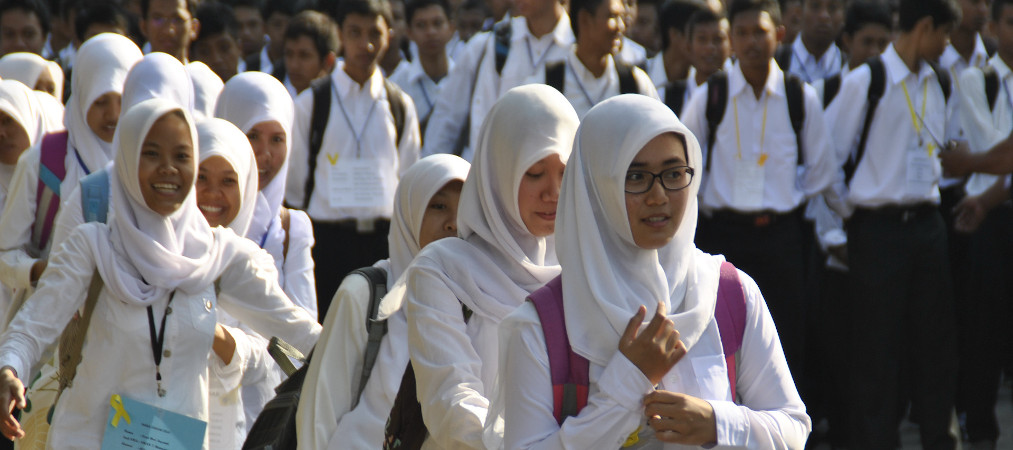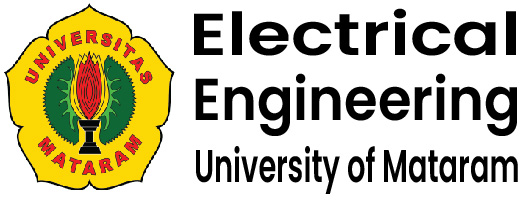
The Bachelor of Electrical Engineering, University of Mataram (BEE of UNRAM) offers scientific methods and skills in accordance with new technological advancements for solving actual problems and community needs.
Important objectives of BEE of UNRAM study program are lecturing ofmethodological and social competence, working with large portions of practical laboratory exercises, and carrying out independent as well as group projects that are intensively supervised by lecturers. The EEUM study program leads to a Bachelor of Engineering degree, with majoring in Electric Power System Engineering, Electronics Engineering, Telecommunication Engineering, and Computer Engineering.
The BEE of UNRAM curriculum is intensively developed to support four areas of research excellences, i.e. (i) Geo-electromagnetics, (ii) Internet of Thing and Sensor Technology, (iii) New and renewable Energy, and (iv) Smart Electric Vehicle. The Bachelor's program of BEE of UNRAM prepares students inorder to be ready and able to be involved in engineering activities.
The graduates of EEUM should be not only excellent in knowledge, technical competencies and methodological skills; but also faithful, having good attitude, care for humanity and responsible for the environment.
ELECTRICAL POWER SYSTEM ENGINEERING
Electrical Energy plays a very important role and is greatly increasing. The development of power system techniques towards the provision of smart electrical energy and low carbon energy sources. Electrical Power Systems Engineering at the University of Mataram developed an understanding of how power grids will be designed and operated in the future. Electrical Power Systems Engineering Mataram University contributes to the advancement of science and technology in the electricity and energy sector covering the fields of Electric Power Generation, Transmission and Distribution, Power Electronics, Power Quality, Power Economics, Renewable Energy, Smart Grid, Electromagnetic Compatibility, Electrical Engineering Materials, Energy Planning, Lightning Detection and Protection, Power System Analysis, SCADA, Electrical Measurements High Voltage Direct Current, Electric Vehicle.
ELECTRONIC ENGINEERING
Electronics Engineering prepares students to have knowledge and skills in the field of electronics engineering. In order to achieve the goal the students study several courses related to electronics engineering, including electronic circuits, electronic instrumentation systems, analog and digital control systems, microprocessors, mechatronics, robotics and interface engineering and embedded systems. In the field of Electronics Engineering, you will design and manufacture systems that utilize sensors, systems that use microprocessors and microcontrollers, robotics systems and other things related to analog and digital electronics.
COMPUTER ENGINEERING
Computer Engineering is a field that integrates science and technology in the design, construction, implementation, and maintenance of modern computing systems, computer-controlled equipment, the Internet of Things, and their related applications and networks of intelligent devices. In this discipline, students will gain expertise in a variety of computer technologies, including the Internet of Things, Data Mining, Artificial Intelligence, and network and database security.
TELECOMMUNICATIONS ENGINEERING
LABORATORY
Digital Electronics Laboratory
The Electronics laboratory in the Electrical Engineering department is a facility that provides students with a hands-on experience in various aspects of electronics systems. The laboratory is designed to enhance students' understanding of fundamental and advanced concepts of electronics, as well as to foster creativity in the design and implementation of various electronics projects.
Explore Electronics Laboratory
Power System Laboratory
The Power System Laboratory in the Electrical Engineering department is a facility designed to provide students with practical exercises related to electric power systems. The laboratory is equipped with state-of-the-art technology and equipment that enable students to gain hands-on experience in the field of power systems.
Explore Power System Laboratory
Basic Electrical Laboratory
The Basic Electrical Circuit Laboratory in the Electrical Engineering department is a facility designed to provide students with practical exercises related to electrical circuits and measurements. The laboratory is equipped with state-of-the-art technology and equipment that enable students to gain hands-on experience in the field of basic electrical circuits.
Explore Basic Electrical Laboratory
Control System Laboratory
The Control Systems Laboratory in the Electrical Engineering department is a facility designed to provide students with practical exercises related to microprocessor systems, control systems, and power electronics. The laboratory is equipped with state-of-the-art technology and equipment that enable students to gain hands-on experience in the field of control systems.
Explore Control System Laboratory
Telecommunication Laboratory
In Telecommunicatons laboratory, students will gain practical experience in designing, building, and analyzing basic communication systems. They will learn to work with digital signal processing techniques, use advanced telecommunications equipment, and conduct measurements on communication systems.
Explore Telecommunications Laboratory
Computer And Network Laboratory
The computer and network laboratory at the electrical engineering department is a facility used for practical exercises related to computer networking and programming. In this laboratory, students can learn about the concepts and applications of computer networking and develop skills in object-oriented programming, database, algorithm, and data structure. The practical exercises include the use of network devices, network configuration, troubleshooting, and the development of applications based on algorithms and data structures.
Explore Computer and Network Laboratory
RESEARCH AREA
Power Electronics and Drives Research Group (PED-RG)
One of Group Research in University of Mataram that is focused on the development of power converters devices for particular applications of renewable energy power plant and variable speed drive of electric machines. PED-rg interested in various research topics, namely : Design and production of high efficiency inverters, Power Converters, Rectifiers and Cycloconverters ...
Electromagnetic Technology
Geomagnetic anomalies in Indonesia belong to the eight strongest anomalous regions in the world, with Lombok island regions in Nusa Tenggara becomes the most prominent one. The Center of Excellence in Science and Technology "Geomagnetic" at University of Mataram have consistently conducted regional surveys and aimed to perform a long term observations to provide good quality data and comprehensive analysis of regional tectonic changes, regarding earthquake mitigations as well as explorations of geothermal energy potential and natural resources.
Explore Lombok Geomagentic Observatory (LOK)
Energy and Electric Powers
Energy and power of electrical is very important to support in each aspects of modern life. It is greatly the development of power system techniques towards the provision of smart electrical energy and low carbon energy sources. Research topics such as: Advanced of science and technology in the electricity and energy sector covering the fields of electric power generation, transmission and distribution, power electronics, power quality, power economics, renewable energy, smart grid, electromagnetic compatibility, electrical engineering materials, energy planning, lightning detection and protection, power system analysis, SCADA, electrical measurement, high voltage direct current technology and intelligent control application in power system.
Explore Energy and Electric Powers Research Group
Internet Of Things
The connection of devices to the internet is growing rapidly and an increasing number of devices are being connected to the internet. This has led to the generation of a large amount of data from these devices. To address this issue, IoT (Internet of Things) technology is needed, which allows these devices to connect and send data to one place, namely the cloud. The data generated by IoT devices is very large and complex, requiring an AI approach to analyze and obtain accurate information from the data.
Sensor and Industrial Automation Research Group (SIAR)
The Industrial Automation and Sensor Research Group is a team dedicated to advancing the field of automation and sensor technology. Their focus is on researching and developing cutting-edge technologies that will have a significant impact on industrial processes and operations. The group's areas of expertise include electromagnetic and acoustic sensors, tomography systems, mechatronics, and automatic control..
